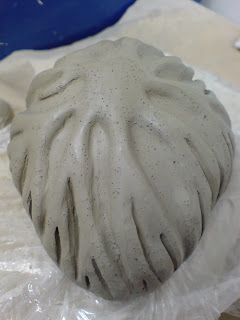




Using the same mould as the wax 'hearts', I've been slip casting in porcelain and also white earthenware. The brush on glazes seem to take better with the white earthenware casts.
The first cast was in porcelain, and it collapsed a bit as it was taken out of the mould too early. It takes a while to get the timings right. The second try was much more successful. The seams were cleaned up before leaving to dry out for 5-7 days, then fired. Before firing, it is clear to distinguish between the porcelain (which is white) and the white earthenware (which is grey), but care must be taken not to mix them up if firing in the same kiln, as when they come out they are both a very pure white colour. It's very hard to tell the difference!
One porcelain 'heart' was glazed with 'white opaque gloss glaze 500 MIs' P0064. The other porcelain heart was glazed with 'Sky Blue leadfree brush on glaze' P2825. I glazed the white earthenware heart with the same white opaque gloss glaze as the porcelain heart (the one that had lost its form a little bit). They were fired at 1040 degrees.
The white porcelain heart had tiny little cracks all over it, which in fact portrayed the fragility I was going for, so I brought the cracks out with some ink.
The white glazed w. earthenware came out crack-free, but the seam was still showing slightly. Should've sanded it down a bit more before glazing! The sky blue porcelain heart came out well, the glaze around the opening made it look soft and inviting. The only thing was that there were cracks but they are not visible until you get up close. I could do it again, this time in w. earthenware if I wanted to minimise the risk of cracking.

































